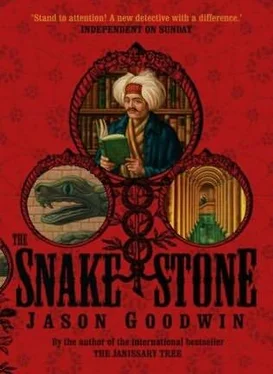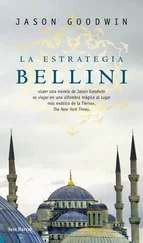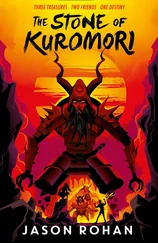Jason Goodwin - The snake stone
Здесь есть возможность читать онлайн «Jason Goodwin - The snake stone» весь текст электронной книги совершенно бесплатно (целиком полную версию без сокращений). В некоторых случаях можно слушать аудио, скачать через торрент в формате fb2 и присутствует краткое содержание. Жанр: Исторический детектив, на английском языке. Описание произведения, (предисловие) а так же отзывы посетителей доступны на портале библиотеки ЛибКат.
- Название:The snake stone
- Автор:
- Жанр:
- Год:неизвестен
- ISBN:нет данных
- Рейтинг книги:4 / 5. Голосов: 1
-
Избранное:Добавить в избранное
- Отзывы:
-
Ваша оценка:
- 80
- 1
- 2
- 3
- 4
- 5
The snake stone: краткое содержание, описание и аннотация
Предлагаем к чтению аннотацию, описание, краткое содержание или предисловие (зависит от того, что написал сам автор книги «The snake stone»). Если вы не нашли необходимую информацию о книге — напишите в комментариях, мы постараемся отыскать её.
The snake stone — читать онлайн бесплатно полную книгу (весь текст) целиком
Ниже представлен текст книги, разбитый по страницам. Система сохранения места последней прочитанной страницы, позволяет с удобством читать онлайн бесплатно книгу «The snake stone», без необходимости каждый раз заново искать на чём Вы остановились. Поставьте закладку, и сможете в любой момент перейти на страницу, на которой закончили чтение.
Интервал:
Закладка:
Yashim was an Ottoman. The Ottomans had always understood that men acted for good or ill not because they were Greek, or Serb, or peasants from Anatolia, but because they chose a path for themselves, selected the tools they wanted on their journey through life. Sometimes the choice was limited. But many a great pasha-many a grand vizier-stroking his beard in the Divan as he formulated some great policy of the state, had sprung from the humblest origins. Greeks, Bulgars, Serbs-you gave the right man good tools and he would make them work for him.
To love Greece-and hate the Greeks: only a Frank, Yashim thought, could make such a ridiculous blunder.
He thought of the man with the knife.
“What will you do now?” he had to ask.
“I will help you find the men who killed my husband,” she said. Exactly as he had expected.
Just as he’d feared.
“I have to go to the palace,” he explained. “Don’t go out.”
69
A girl came in, bearing mint tea and baklava on a tray. “It’s these girls I am sorry for,” the valide remarked. “They have so little to do with everyone gone to Besiktas. But they know that I can’t go on forever, so. Eat these pastries, and tell me about the big city.”
Yashim told her, sparing none of the details he knew she would enjoy. He told her about the gruesome murder near the Grande Rue, about Goulandris and his adventure in the caique and the two men who had come to destroy his flat. The killing and the attempted assassination interested her; but she was transfixed by the details of the men’s bestial behavior in his apartment.
“Quel sacrilege!” she murmured, quite horrified. “To think that there are men capable of such acts! It must make you proud.”
“Proud, Valide?”
“ Mais, bien sur. Only a milksop has no enemies. To be hated-that is a mark of character. Hold by your friends, take risks, and- ecraser les autres a la merde! ” She raised a delicate eyebrow. “I did not become valide as a reward for politesse, Yashim. But these days people are far too timid and polite. It’s good to hear you talk, even if the details are inappropriate for an old lady’s ears. Go on, have another pastry. I have no appetite.”
“I hope I haven’t spoiled it,” Yashim said.
The valide cast him a mischievous look. “Not at all. Perhaps you have restored it. What are you reading? But of course, your collection is destroyed, and you have come to me for a book.”
“No. It’s something else I want, Valide.” He saw the corners of her mouth harden. “For the sake of the archaeologist, your compatriot,” he began, sweetening the story with a little lie, “I’d like to consult with the master of the watermen’s guild.”
That “consult,” he thought, was a good touch.
“Et alors?” The valide gave a little shrug. “I am so out of touch, my friend.”
It was Yashim’s turn to use the mischievous look. “I don’t think so,” he said.
The valide suppressed the beginning of a smile. “ Enfin, I may be able to write a note. The sultan’s bostanci could help, I think; he deals with the watermen all the time. He’s an old friend, though he goes by some other title these days. Commissioner of Works, or nonsense of that sort.”
She knows his new title perfectly well, Yashim thought. She sits here, in a palace half deserted, and not a thing that goes on here or in Besiktas escapes her notice.
The valide rang a little silver bell. “Notepaper, and a pen,” she told the girl who answered. “In the meantime, Yashim, you may read to me a little from this book. I don’t understand it, and I don’t think I like it. But it also makes me laugh. So don’t be afraid-I shan’t be laughing at your accent.”
And with this whisper of a challenge, the faintest tinkling of her spurs beneath the raillery, she held out a copy of Stendhal’s Le Rouge et le noire.
70
“Tell me,” Yashim said. “Tell me about the ancient Greeks.”
Amelie was lying facedown on the divan, her head in the sunlight, resting her chin on her hands. Yashim heard her giggle.
“I could talk for days,” she said. She moved her head so that her cheek was resting on her fingers, and she looked at him. “Let’s do a swap,” she suggested. “I’ll tell you about the finest hour of ancient Greece, and you tell me about your people. The Ottomans. Their greatest moment.”
Yashim cocked his head. “Agreed,” he said. He crossed his legs and sat by her in the window. “A time of war? Or a time of peace?”
Amelie smiled. “War first,” she said.
“Ah, war.” Yashim straightened his back. “The sultan Suleyman, then. Suleyman, the Giver of Laws. In French-the Magnificent. He is twenty-two when he leads our armies to Belgrade. The White City-impregnable, lying between two rivers, the Sava and the Danube, defended by the hosts of Christendom. It is a long and a weary march…”
He told of Suleyman’s victory at Belgrade, and his conquest of Rhodes two years later, of his prowling the borders of Austria, and humbling Buda.
“You look different when you talk like that.”
“Different?”
“Fierce. Like Suleyman.” She nestled her cheek against her palm, and her hips moved against the carpeted divan. “Tell me about peace.”
“I’ll tell you about a poet,” Yashim said. “In time of poetry-with a sultan who surrounds himself with poets. Every night they hold a Divan of poetry, each man trying to outdo the other with the beauty of his words. Rhyme, meter the highest expressions of love and sadness and remorse. But the sultan is better than them all.”
He heard Amelie give a little snort. He glanced down. Her eyes were closed, and a light skein of her brown hair had fallen across her cheek. She was smiling.
“Ah, but he was,” Yashim insisted. “He was a poet of love-because of all our sultans, he was the one who loved one woman most. He had hundreds of women-the most beautiful girls from Circassia and the Balkans-but one he loved beyond all the rest. She had red hair and pale white skin, and dark, dark soulful eyes. She was-they say she was a Russian. Roxelana. He married her.”
He bent forward and softly recited the lines he knew by heart.
Amelie lay still for a few moments. “What was his name? The poet-sultan?”
“Suleyman. Suleyman the Magnificent.”
She opened her eyes and sought him out. He was very close.
“The same sultan,” she murmured. She arched her back and raised her head, until she was looking at Yashim.
Slowly, hesitantly, she moved closer to him. Her eyes flickered from his eyes to his lips.
Yashim felt himself weightless, like a feather in the wind.
Their lips touched.
Her arm slipped around his neck. He put out a hand and touched the curve of her hip.
It was a long time before either of them could speak.
“You were going to tell me about the Greeks,” Yashim said.
Amelie smiled and touched a finger to the tip of his nose.
“Right now,” she said, “I’m more interested in Ottomans.”
71
Sunlight slid across the divan as the afternoon wore on.
He broke away from her once: from her interest. She had understood. She soothed him back to her with little cries, like a bird. She had put her fingers to his lips.
“Max never kissed me like that,” she said finally.
He left her reading the Gyllius; it was the least he could do.
“Remember, Gyllius is writing about a vanished world. Perhaps something in this will spark a memory.”
He caught a last glimpse of her on the divan: her hair in the sun, a finger on her chin, and the curve of her hip like a wave that could drown him.
72
Интервал:
Закладка:
Похожие книги на «The snake stone»
Представляем Вашему вниманию похожие книги на «The snake stone» списком для выбора. Мы отобрали схожую по названию и смыслу литературу в надежде предоставить читателям больше вариантов отыскать новые, интересные, ещё непрочитанные произведения.
Обсуждение, отзывы о книге «The snake stone» и просто собственные мнения читателей. Оставьте ваши комментарии, напишите, что Вы думаете о произведении, его смысле или главных героях. Укажите что конкретно понравилось, а что нет, и почему Вы так считаете.












